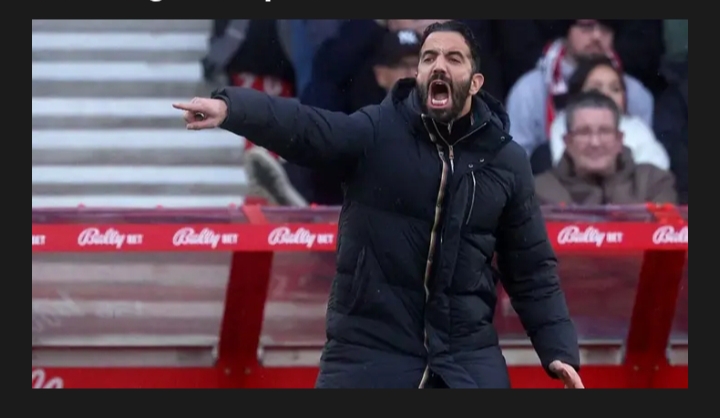Man Utd Fans Demand Ruben Amorim Drops Player ASAP After Nottingham Forest Draw
Here’s a detailed look at what happened following the Manchester United 2–2 draw with Nottingham Forest, how fans reacted, and why there is now a growing demand that Rúben Amorim “drop” a specific player for the next match.
—
Match recap and key moments
United traveled to the City Ground looking to build on a three-game winning streak. They took the lead just before half-time via Casemiro’s header. But early in the second half they collapsed: Forest struck twice in the opening minutes of the half (goals by Morgan Gibbs‑White and Nicolo Savona) to turn the game on its head. United rescued a point through Amad Diallo’s wonderful volley late on, but the draw leaves many fans uneasy given how the lead was lost.
Rúben Amorim himself admitted the team allowed their energy to drop and “lost control of the game for five minutes and we paid the price.”
—
Why the fans are calling for a player to be dropped
Almost immediately after the final whistle, social media lit up with frustration aimed at one particular player: Diogo Dalot. Many fans believe his performance was the focal point of United’s collapse. He was replaced in the 69th minute by Patrick Dorgu, which in itself suggests the coaching staff recognised a problem.
Common grievances from fans include:
Dalot being “poor” defensively for the second-half goals conceded.
A perception that as a right-footed full-back playing wide (or forced into uncomfortable positional roles), he lacked the physicality or positional discipline the system required.
Fans calling for immediate change: “Dalot costs us over and over… Why does Amorim keep playing him?” (quoting fans)
In short: the mismatch between Dalot’s performance and the demands of the game triggered calls for him to be dropped against the upcoming league fixture (against Tottenham Hotspur) so United do not repeat the same vulnerability.
—
What this says about squad management and tactical priorities
For Amorim and United, the situation speaks to deeper issues than just one under-performing player:
Tactical alignment: The drop in energy and concentration in that five-minute spell suggests a systemic fault rather than only a single individual mistake. Yet Dalot’s role as full-back makes him a visible link to those defensive lapses.
Player suitability and role clarity: Using a right-footed defender in a wide role (if that was the case) raises questions about whether the personnel fit the tactical demands. Amorim’s own comment about Dalot’s footedness and the space issue implies he sensed a mismatch.
Squad depth and rotation: If Dalot is now the scapegoat of this collapse, United must ensure they have viable alternatives ready. Dropping him without strengthening or having a plan risks repeating the same problems.
Accountability culture: Fans demanding a drop shows rising expectations under Amorim. It signals they expect tougher managerial decisions and less tolerance for under-performance.
—
Risks and benefits of dropping Dalot now
Benefits
Sends a message of accountability: Choosing to bench Dalot would show that mistakes have consequences and standards matter.
Potential tactical improvement: A different full-back might bring more defensive solidity, better positional awareness, or stronger offensive support matching the system’s demands.
Eases fan frustration: Taking action may calm the growing disquiet among supporters and reaffirm the club’s ambition.
Risks
Destabilisation: Changing the full-back position may upset continuity, chemistry and defensive organisation.
Impact on morale: If Dalot remains in favour and feels vulnerable, morale might drop.
Uncertain upgrade: If the alternative to Dalot is not clearly better, this change might be superficial, and problems could persist.
—
What needs to happen next
For Amorim, the path forward should include:
1. Post-match review: A detailed analysis of the five-minute collapse, looking at defensive shape, pressing triggers, physical conditioning and individual mistakes.
2. Personnel decision: Decide whether Dalot remains part of the starting XI, rotated or replaced. If he stays, ensure he understands what changed in his role and how to improve.
3. Clear communication: The staff must communicate to the squad why changes (or non-changes) are being made so players understand expectations and the system’s demands.
4. Tactical tweak: For the upcoming match vs Tottenham, ensure full-backs are selected not only for offensive output but also for defensive resilience and positional discipline.
5. Fan engagement: While fans are not directly part of squad decisions, a public acknowledgement of the issues and a clear plan from the manager will help build trust and calm unrest.
—
Broader narrative for United under Amorim
This incident highlights a recurring theme at United: transition. Amorim has made clear his expectations of energy, compactness and sustained intensity. The draw with Forest shows both progress (given United recovered) and fragility (given the lapse).
The fan outcry over Dalot’s performance is symptomatic of rising impatience — supporters see the potential of a new era, but demand consistency. If United are to move from resurgence to stability, then mistakes like the Forest collapse cannot become habit. Players must deliver, and the manager must enforce standards.
Dalot’s situation is illustrative: Not simply about one game, but about role, suitability and performance under pressure. If he is dropped it will signal that United are serious about enforcing better defensive organisation. If he stays and repeats errors, it may raise deeper questions about recruitment and strategy.
—
Conclusion
The 2-2 draw with Nottingham Forest may be seen as only one game, but its consequences are potentially significant. Fans’ calls for Rúben Amorim to drop Diogo Dalot highlight a tipping point: United’s supporters expect more than glimpses of good play — they expect solidity, discipline and wins.
Amorim now faces a decision: act decisively and signal that under-performance has consequences, or risk allowing vulnerabilities to persist. For United’s season ambition, the choice matters. One player’s shaky display has become a focal point — and what happens next will reflect not just on Dalot, but on the manager’s authority and the team’s direction.











Leave a Reply